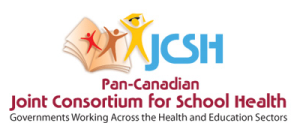Review our 5-year plan and see how we hope to effect positive outcomes for students across Canada
Pan-Canadian Joint Consortium for School Health.
Proposed Strategic Directions 2020-2025 Context
In 2005, Canada’s provincial and territorial ministers responsible for health and education pioneered a new approach to improving the health and learning for school-aged children and youth: the Pan-Canadian Joint Consortium for School Health (JCSH). They recognized that, statistically, young people were at risk for a range of physical, psychological, and behavioural problems – and that these kinds of issues have major implications not only for learning, but also for long-term health and health care costs.
Today, the JCSH comprises the ministries of education and ministries responsible for health/wellness in 12 of the 13 provinces and territories1. The federal government also supports the work of the Consortium, with the Public Health Agency of Canada (PHAC) serving in a funding and advisory capacity.
JCSH serves as the foundational platform to facilitate and promote collaboration among its inter-governmental provincial and territorial membership. The JCSH facilitates jurisdictions to work together and to support and build capacity within its member governments. In this role, JCSH is an inter-jurisdictional forum that encourages the education and health sectors to work together more efficiently and effectively while promoting and integrating learning, health, and well-being in the school setting.
The JCSH focuses on emerging key priority areas of FPT Ministers of Health and the Council of Ministers of Education, Canada (CMEC), including mental well-being, social emotional learning, and substance use prevention – all of which have key implications for the short and long-term learning, health, and well-being of all students. The work of the JCSH results in many efficiencies and enhancements within and across member jurisdictions, including:
- increased knowledge exchange;
- enhanced collaboration across relevant sectors and jurisdictions;
- improved coordination of school health policy and research agendas;
- development of evidence-based, user-friendly tools and resources; and,
- identification of common strategies to address the needs of diverse population groups.
The work of the JCSH is grounded in the application of a Health Promoting Schools (HPS) (formerly comprehensive school health) approach to address the health-related needs of school communities. HPS is an internationally recognized framework for supporting improvements in students’ health and well-being outcomes, which in turn provide a solid foundation to strengthen student achievement in a planned, integrated, holistic and sustainable way. The World Health Organization has concluded that school health programs designed using a comprehensive school health approach have been found to be the most effective, demonstrating significant improvements in student achievement, behaviour, and health outcomes.
Footnotes:
1 While Quebec is not a member, it intends to contribute to the work of the Consortium through sharing information and best practices.
Mission.
Children and youth in Canada are thriving in school communities that are committed to optimal health, well-being, and learning.
Vision.
To work collaboratively across jurisdictions and between the education and health sectors to support optimal health, well-being, and learning of children and youth in school communities.
Values.
- Collaboration
- Diversity and Inclusion
- Equity
- Evidence-informed practice
- Innovation
- Accountability
- Efficiency
- Knowledge mobilization
Long-Term Outcomes.
The long term outcomes associated with achieving the Consortium’s Mission are:
- Member jurisdictions experience increased capacity, collaboration and efficiency in their efforts to promote optimal health, well-being, and learning outcomes for all students.
- There is a continual exchange of information and knowledge related to optimal health, well-being, and learning outcomes for all students among member jurisdictions.
- The JCSH is recognized by other FPT bodies and key stakeholders for their expertise in the promotion of initiatives to improve the health, well-being, and learning for all students.
Mandate Areas of Focus and Priorities.
During this mandate (2020 – 2025), member jurisdictions will anticipate and provide timely evidence-based responses to emerging health and well-being issues that impact students’ overall learning and long-term development. By working together through the JCSH and continuing to apply the CSH framework, member jurisdictions can assist each other in building ‘upstream’ preventive responses to current and emerging priorities. The initial priorities for a fourth JCSH mandate include:
- Problematic substance use, with a strong initial focus on vaping;
- Mental well-being, including social-emotional learning, resiliency, anxiety, protective factors and disruptive behaviours; and,
- School food environment, including the alignment of healthy eating school food policies and priorities through the comprehensive school health approach.
- COVID-19 support, given the mental, physical, emotional, and academic impacts of the pandemic on school communities, particularly children and youth.
During the course of this mandate, specific topics and areas of focus will evolve and change.
The JCSH is positioned as the foundational platform to support provincial and territorial ministers working together to meet emerging health, well-being, and learning issues. With a focus on these current and emerging priorities, the member jurisdictions of the JCSH are able to identify and support solutions and courses of action to improve student health, well-being, and learning.
Guiding Principles and Strategies
Guiding Principle 1: Providing Leadership
To advance coordinated and aligned policy, programs and practice that support the optimal health, well-being, and learning of children and youth in Canada.
Strategies
Guiding Principle 2: Enhancing Capacity Through Knowledge Development and Exchange
To build, share, and leverage knowledge that enables member jurisdictions to support the optimal health, well-being, and learning of children and youth in Canada.
Strategies
Guiding Principle 3: Promoting Innovation
To support innovative approaches to policy, programs, and practice in member jurisdictions that address common challenges to the optimal health, well-being, and learning of children and youth in Canada.
Strategies
Guiding Principle 4: Monitoring, Evaluation, and Accountability
To implement a comprehensive evaluation framework for the goals, strategies, and operational plans of the JCSH 2020-2025 mandate.

